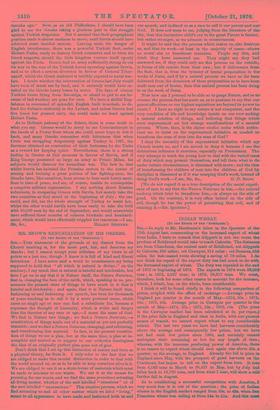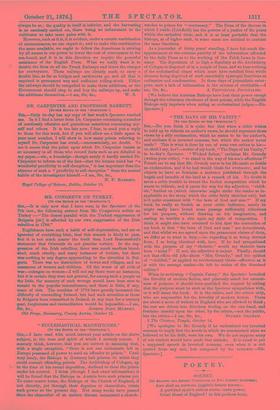INDIAN WHEAT.
[TO THE EDITOR OF THE " SPECTATOR."]
Sra,—In reply to Mr. Marshman's letter in the Spectator of the- 13th August last, commenting on the increased export of wheat from India, I have to remark that Allygurh is not the route the of Rohilcund would take to reach Calcutta. The distances- are from Chandunsi, the central mart of Rohilcund, via Allygurh to Calcutta, 936 miles ; aid Cawnpur, 914 miles ; via Benares, 858 miles, the last-named route showing a saving of 78 miles. I do- not think the repeal of the export duty has had much to do with the increased export of wheat. The duty was repealed in the end of 1872 or beginning of 1873. The exports in 1874 were 39,099 tons ; in 1875, 5,937 tons ; in 1876, 58,317 tons. We muat„, therefore, look for some other reason to account for the increase, which, I admit, has, on the whole, been considerable.
I think it will be found chiefly in the following comparison of prices, coupled with the effect of exchange :—Average price in England per quarter in the month of May-1874, 605.; 1875, 44s.; 1876, 48s. Average price in Cawnpur per quarter in the month of May-1874, 27s.; 1875, 22s.; 1876, 15s. (The price in the Cavrrtpur market has been calculated at 2s. per rupee.) If the price falls in England and rises in India, with our present means of transit, we cannot export wheat to any considerable extent. The last two years we have had harvests considerably above the average and consequently low prices, but we have not had such low prices since 1860, and certainly cannot anticipate their remaining so low for any length of time ; whereas, with the immense producing power of America, there is no reason to expect wheat should ever again rise above 50s. a quarter, on the average, in England. Already the fall in price in England since May, with the prospect of good harvests oa the Continent, has begun to tell on the export from here. It rose from 6,063 tons in March to 26,477 in May, but by July had fallen back to 18,780 tons, and from what I hear, will show a stalk further fall in August.
As to establishing a successful competition with America, I very much fear it is out of the question ; the price of Indian wheats in the English market ranged from 39s. to 4.33. when San Francisco wheat was selling at from 44s. to 51s. And this must always be so ; the quality in itself is inferior, and the harvesting is so carelessly carried on, there being no inducement to the cultivator to take more pains with it.
However, such as it is, it is evident, under a certain combination of circumstances, we can export it; and to make this combination the more available, we ought to follow the Americans in striving by all means in our power to lower the cost of conveyance to the -sea-board, and it is in this direction we require the powerful assistance of the English Press. What we really want is to double the lines on all the Trunk Railways and lower the charges for conveyance. These railways are already made to carry a double line, as far as bridges and earthworks go, and all that is required is permanent way and sufficient rolling-stock. Either the railways should be compelled to make these additions, or the Government should step in and buy the railways up, and make the additions themselves.—I am, Sir, &c., W. S.



































 Previous page
Previous page